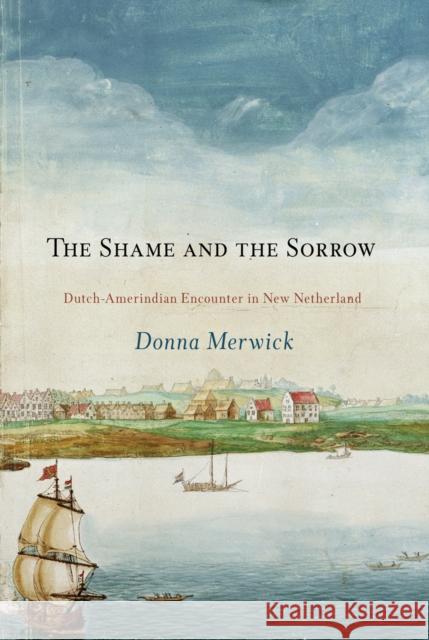The Shame and the Sorrow: Dutch-Amerindian Encounters in New Netherland » książka
The Shame and the Sorrow: Dutch-Amerindian Encounters in New Netherland
ISBN-13: 9780812222722 / Angielski / Miękka / 2013 / 344 str.
The Shame and the Sorrow Dutch-Amerindian Encounters in New Netherland Donna Merwick "Merwick is unafraid of 'weighing up' the evidence carefully to recapture the 'moral murkiness' that dominated seventeenth-century Netherlanders' efforts. . . . A] beautifully constructed work."--Australasian Journal of American Studies "Merwick's book is certainly interesting, often beautifully written, but it is also a strong contribution to historical scholarship."--American Historical Review The Dutch, through the directors of the West India Company, purchased Manhattan Island in 1625. They had come to the New World as traders, not expecting to assume responsibility as the sovereign possessor of a conquered New Netherland. They did not intend to make war on the native peoples around Manhattan Island, but they did; they did not intend to help destroy native cultures, but they did; they intended to be overseas the tolerant, pluralistic, and antimilitaristic people they thought themselves to be--and in so many respects were--at home, but they were not. For the Dutch intruders, establishing a settled presence away from the homeland meant the destabilization of the adventurers' values and self-regard. They found that the initially peaceful encounters with the indigenous people soon took on the alarming overtones of an insurgency as the influx of the Dutch led to a complete upheaval and eventual disintegration of the social and political worlds of the natives. How are the Dutch to be judged? Donna Merwick, in The Shame and the Sorrow, asks this question. She points to a betrayal both of their own values and of the native peoples. She also directs us to the self-delusion of hegemonic control. Her work belongs alongside the best of today's postcolonial studies in the description of cross-cultural violence and subtle questioning of the nature of writing its history. Donna Merwick is Senior Fellow in the Department of History at the University of Melbourne, Long Term Visiting Fellow at Australian National University, and Adjunct Associate Professor in the Swinburne Institute for Social Research at the Swinburne University of Technology. She is the author of Stuyvesant Bound: An Essay on Loss Across Time, also available from University of Pennsylvania Press, and Death of a Notary: Conquest and Change in Colonial New York. Early American Studies 2006 344 pages 6 1/8 x 9 1/4 20 illus. ISBN 978-0-8122-2272-2 Paper $26.50s 17.50 ISBN 978-0-8122-0280-9 Ebook $26.50s 17.50 World Rights American History, Native American Studies Short copy: During the forty years of the Dutch presence in colonial America, their intrusion led to the betrayal of their own values and the betrayal of the indigenous peoples. They reaped the shame of reproaching themselves for unjust wars and faced a native insurgency that they could neither negotiate nor satisfactorily quell.
The Shame and the SorrowDutch-Amerindian Encounters in New NetherlandDonna Merwick"Merwick is unafraid of 'weighing up' the evidence carefully to recapture the 'moral murkiness' that dominated seventeenth-century Netherlanders' efforts. . . . [A] beautifully constructed work."--Australasian Journal of American Studies"Merwick's book is certainly interesting, often beautifully written, but it is also a strong contribution to historical scholarship."--American Historical ReviewThe Dutch, through the directors of the West India Company, purchased Manhattan Island in 1625. They had come to the New World as traders, not expecting to assume responsibility as the sovereign possessor of a conquered New Netherland. They did not intend to make war on the native peoples around Manhattan Island, but they did; they did not intend to help destroy native cultures, but they did; they intended to be overseas the tolerant, pluralistic, and antimilitaristic people they thought themselves to be--and in so many respects were--at home, but they were not.For the Dutch intruders, establishing a settled presence away from the homeland meant the destabilization of the adventurers' values and self-regard. They found that the initially peaceful encounters with the indigenous people soon took on the alarming overtones of an insurgency as the influx of the Dutch led to a complete upheaval and eventual disintegration of the social and political worlds of the natives.How are the Dutch to be judged? Donna Merwick, in The Shame and the Sorrow, asks this question. She points to a betrayal both of their own values and of the native peoples. She also directs us to the self-delusion of hegemonic control. Her work belongs alongside the best of today's postcolonial studies in the description of cross-cultural violence and subtle questioning of the nature of writing its history.Donna Merwick is Senior Fellow in the Department of History at the University of Melbourne, Long Term Visiting Fellow at Australian National University, and Adjunct Associate Professor in the Swinburne Institute for Social Research at the Swinburne University of Technology. She is the author of Stuyvesant Bound: An Essay on Loss Across Time, also available from University of Pennsylvania Press, and Death of a Notary: Conquest and Change in Colonial New York.Early American Studies2006 | 344 pages | 6 1/8 x 9 1/4 | 20 illus.ISBN 978-0-8122-2272-2 | Paper | $26.50s | L17.50 ISBN 978-0-8122-0280-9 | Ebook | $26.50s | L17.50 World Rights | American History, Native American StudiesShort copy:During the forty years of the Dutch presence in colonial America, their intrusion led to the betrayal of their own values and the betrayal of the indigenous peoples. They reaped the shame of reproaching themselves for unjust wars and faced a native insurgency that they could neither negotiate nor satisfactorily quell.











